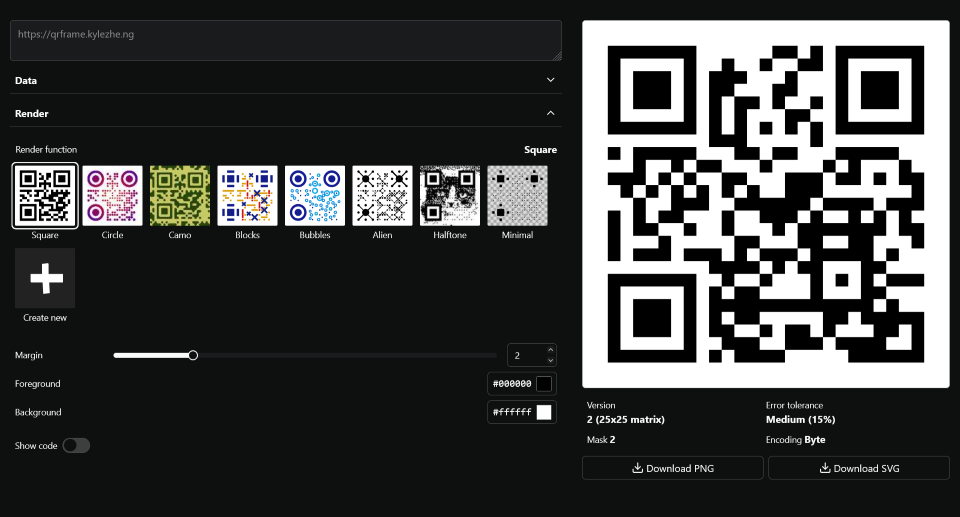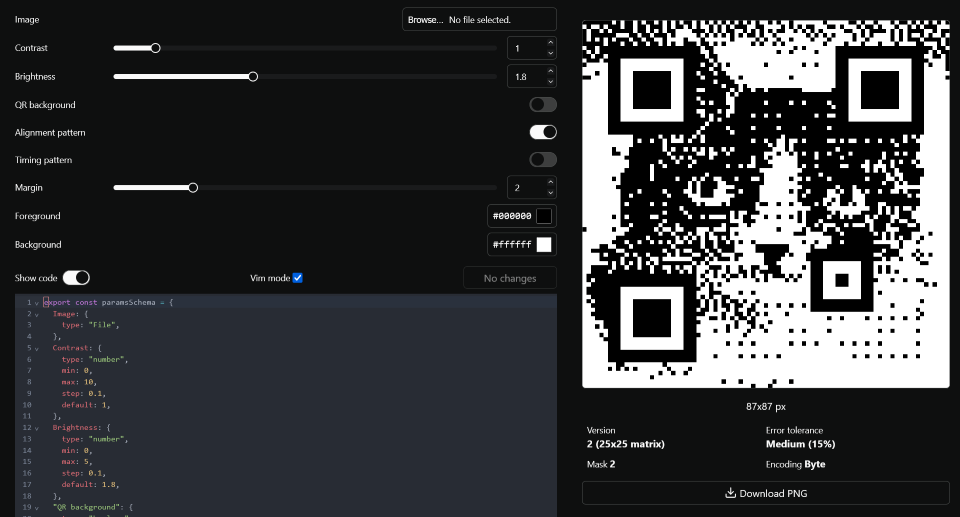code-based qr code generator
Blatantly inspired by QRBTF and Anthony Fu's QR Toolkit.
Here's a post I wrote about crafting QR codes that goes into deeper detail about how they work and ways to make them pretty.
I'm working on more examples.
| Creative possibilities | ||
|---|---|---|
|
|
|
|

|
|
|
|
|
|
|
|
|
|
|
| Import external libs, fetch external files, etc | ||

|

|

|
| Styles copied from QRBTF | ||
|
|
|
|
| Boring options are available | ||

|

|

|
-
Customize data:
- encoding mode, version, error tolerance, mask pattern
- powered by
fuqr, my own Rust library imported as WASM. (i use windows, btw)
-
Customize appearance:
- Choose any preset, customize or even create a new one from scratch via code editor.
- Define arbitrary UI parameters in code
- Supports SVG and PNG
- All code runs directly in browser in a web worker with no restrictions.
- There is no sandbox, whitelist, blacklist, or anything besides a 5s timeout to stop infinite loops.
- Generated SVGs are not sanitized. This is an impossible task and attempting it breaks perfectly fine SVGs, makes debugging harder, and adds latency to previewing changes.
- These should be non-issues, but even if you copy-and-paste and run malware there's no secrets to leak.
A preset must export paramsSchema and either renderSVG or renderCanvas
This schema defines the UI components whose values are passed into renderSVG or renderCanvas via the params object.
All properties besides type are optional, except
- type
selectmust have a nonempty options array - type
arraymust have a validpropsvalue.
In this example, default is set explicitly to the implicit default value.
export const paramsSchema = {
Example1: {
type: "number",
min: 0,
max: 10,
step: 0.1,
default: 0,
},
Example2: {
type: "boolean",
default: false,
},
Example3: {
type: "color",
default: "#000000", // css color string (hex/rgba/hsla)
},
Example4: {
type: "select",
options: ["I'm feeling", 22],
default: "I'm feeling", // first option
},
Example5: {
type: "file",
accept: ".jpeg, .jpg, .png",
default: null,
},
Example6: {
type: "array",
props: {
type: "number", // any type except "array"
// corresponding props
},
resizable: true,
defaultLength: 5, // overridden by default
default: [], // overrides defaultLength
},
};type renderSVG = (qr: Qr, params: Params) => string;
type renderCanvas = (qr: Qr, params: Params, canvas: OffscreenCanvas) => void;params is an object with all the keys of paramsSchema paired with the value from their respective input component.
qr contains the final QR code in matrix. This represents a square where one side is version * 4 + 17 wide, and modules (aka pixels) are stored from the left to right, top to bottom.
type Qr = {
matrix: Uint8Array; // see below
version: number; // 1- 40
mask: number; // 0 - 7,
ecl: number; // 0 - 3, Low, Medium, Quartile, High
mode: number; // 0 - 2, Numeric, Alphanumeric, Byte
};
// bit flags for each u8 in matrix
const Module = {
ON: 1 << 0,
DATA: 1 << 1,
FINDER: 1 << 2,
ALIGNMENT: 1 << 3,
TIMING: 1 << 4,
FORMAT: 1 << 5,
VERSION: 1 << 6,
MODIFIER: 1 << 7,
};MODIFIER is set for Finder and Alignment centers, Format and Version copy.

